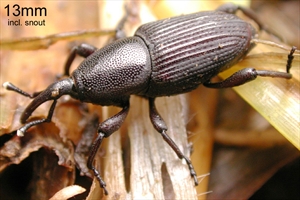- Worldwide distribution. On banana and Musa species. Grubs burrow into the corms causing rots, small bunches, and weak plants that are easily blown over. Symptoms are like “toppling” which is caused by nematodes.
- Estimate population with 10 cm thick stem discs, 20 per ha; treat if >4 weevils per disc at 5 days.
- Cultural control: plant only weevil-free suckers (slice corms to check for grubs/tunnels); leave land fallow for >3 months before replanting; hot water against nematode (53°C for 20 mins.) will kill grubs; if plants fall, cut the stem so it dries rapidly.
- Chemical control: chlorpyrifos, fipronil, bifenthrin, imidacloprid. Pheromone available for mass capture.
Pacific Pests, Pathogens and Weeds - Online edition
Pacific Pests, Pathogens, Weeds & Pesticides
Banana weevil (109)
Banana weevil, banana weevil borer, banana root borer
Cosmopolites sordidus
AUTHOR Grahame Jackson
Information from Waterhouse DF, Norris KR (1987) Cosmopolites sordidus (Germar). Biological Control Pacific Prospects. Inkata Press; and CABI (2020) Cosmopolites sordidus (banana weevil). Crop Protection Compendium. (https://www.cabi.org/cpc/datasheet/15495); and from Woodruff RE (2018) Cosmopolites sordidus (Germar). Featured Creatures, Entomology & Nematology. UF/IFAS, University of Florida. (http://entnemdept.ufl.edu/creatures/fruit/borers/banana_root_borer.htm). Photo 1 Gerald McCormack, Cook Islands Biodiversity & Natural Heritage. (http://cookislands.bishopmuseum.org/).
Produced with support from the Australian Centre for International Agricultural Research under project PC/2010/090: Strengthening integrated crop management research in the Pacific Islands in support of sustainable intensification of high-value crop production, implemented by the University of Queensland and the Secretariat of the Pacific Community.




